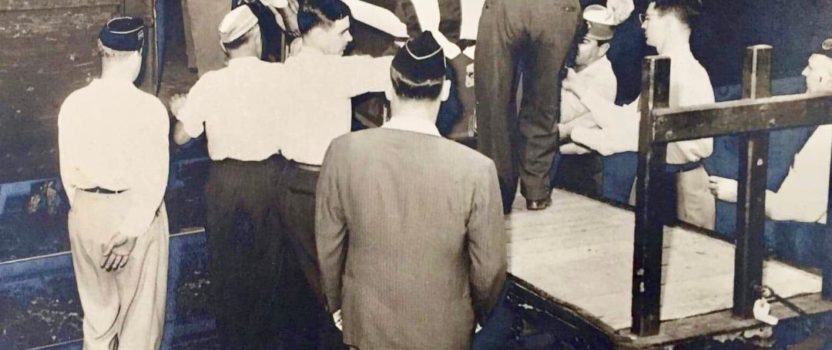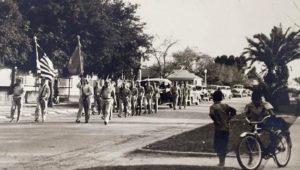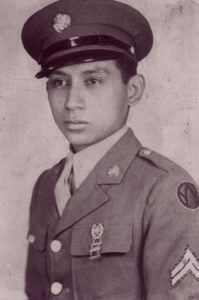Native Son Of Mercedes Gave His Life To Preserve Freedom
Guadalupe Garcia-Carrasco took out a special flag every Memorial Day and Fourth of July and spread it over a bed or table and smoothed it over in remembrance with memories of a loved one.
Growing up in Mercedes, Oralia Carrasco-Page didn’t fully understand the meaning of that American flag in the life of her mother. She was guarded with her feelings. It would be in later years that Carrasco-Page, who now lives in Utah, comprehended the significance of that flag. It was once draped over the casket of her uncle, Sgt. Marcelo M. Garcia, Jr., who was killed in action during World War II in April 1945.
Three years later, in 1948, the soldier’s remains arrived at the Mercedes train station, making the long trek from a European cemetery. Waiting at the train station was Garcia’s younger sister, 23-year-old Guadalupe, who had lived in grief all those years, awaiting her brother’s return to Mercedes.
“It’s overwhelming to think all my mother had to go through at such a young age,’’ Carrasco-Page said. “She had two kids of her own by then and now she was the one responsible for her brother.’’
Her mother knew hardship at an early age. Guadalupe and an older sister, Belinda, and their three brothers – Marcelo, Fidel and Hilario – became orphaned in the early 1930s when their parents died in a three-year span. Carrasco-Page said Guadalupe and her siblings were bounced from one family member to another and learned to depend on each other in forming a tight bond.
Great challenges – and eventual loss – lay ahead. The three Garcia brothers joined the military and served their country in World War II. Marcelo, the oldest brother, shipped out first. His letters home indicated that he was a young man who felt the distance from home in Mercedes and yearned to see his loved ones again.
“Dearest sister,’’ he wrote to Guadalupe in an early letter from overseas. “I’ll be out of here in a few weeks. Answer soon. I haven’t got a letter from no one yet.’’
A telegram would be sent not long after that letter in which Guadalupe Garcia, who was living at 128 North Colorado Street in Mercedes, was told “that your brother private first-class Marcelo M. Garcia was slightly wounded in action.’’
Garcia would survive that wound and eventually be promoted to staff sergeant. Carrasco-Page said her uncle was part of the 89th Infantry Division, the “Rolling W,’’ that landed in France in January 1945 and quickly advanced to the German front. By early April 1945, the 89th reached the Buchenwald concentration camp, and it would be the first such camp liberated by U.S. troops in Germany.
The 89th was now deep in the heart of Adolph Hitler’s Third Reich. Garcia and the 89th were fighting to save the world from tyranny and drive out the last vestiges of Hitler’s Germany. It was during that time, mid-April 1945, that Sgt. Marcelo M. Garcia of Mercedes, age 24, would lose his life in battle. His death would come less than a month before V-E Day on May 8,1945 when Germany unconditionally surrendered.
“He stands in the unbroken line of patriots who have dared to die that freedom might live,’’ said a commemoration letter from President Harry S. Truman in honoring the memory of Sgt. Garcia
A series of historic photos from November 1948 depict the arrival of Sgt. Garcia to his hometown of Mercedes. Veterans are shown taking his casket draped in an American flag from a rail car to a waiting hearse. Other photos show a military-led funeral procession through downtown Mercedes and eventually to Our Lady of Mercy Catholic Cemetery where a grieving Guadalupe Carrasco – dressed in black with a veil – receives the folded American flag that had laid across her brother’s casket.
“It’s just very emotional,’’ Carrasco-Page said of seeing the photos. “I couldn’t stop crying.’’
She would know the two surviving Garcia brothers as a child and remembered them as being loving and kind uncles, but never speaking of their war years.
“I’m very proud to say they were my family,’’ Carrasco-Page said. “They were very close to one another and with my mother. They could have been bitter with all that had happened to them early in life, but they chose to be law-abiding citizens and serve and defend their country.’’
- Ricardo D. Cavazos



